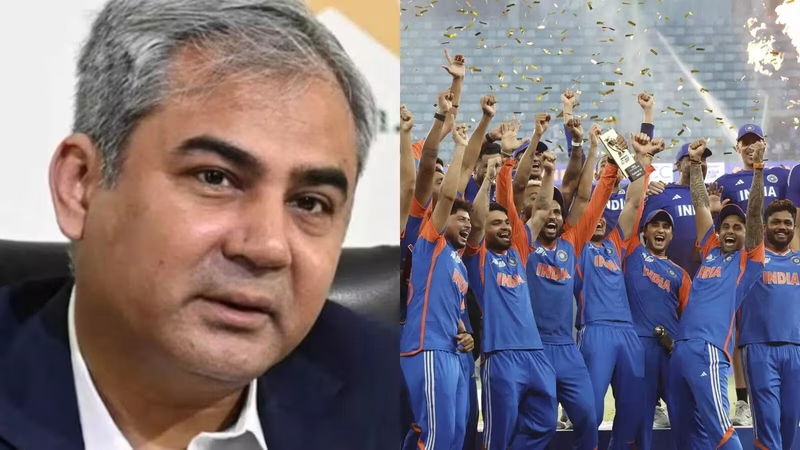In a significant development for Asian cricket diplomacy, the long-simmering Asia Cup trophy row appears to be heading toward resolution. BCCI secretary Devajit Saikia confirmed that a productive, informal discussion took place with Pakistan Cricket Board (PCB) chairman Mohsin Naqvi on the sidelines of the ICC Board meetings in Dubai—and the results are promising. “The ice has been broken,” Saikia stated, signaling a thaw in relations that had grown frosty over the symbolic custody of the Asia Cup trophy .
This breakthrough, facilitated by ICC officials acting as mediators, marks the first concrete step toward mending a rift that threatened to spill over into future tournaments, including the highly anticipated Asia Cup 2025. For fans across the subcontinent, it’s a hopeful sign that cricket—often caught in geopolitical crossfires—may yet return to being a unifying force.
Table of Contents
- What Was the Asia Cup Trophy Row?
- The Dubai Meeting: How the Ice Was Broken
- Role of the ICC as Mediator
- Why This Matters for Asia Cup 2025 and Beyond
- Broader Implications for India-Pakistan Cricket Relations
- Summary
- Sources
What Was the Asia Cup Trophy Row?
The controversy began after the 2023 Asia Cup—co-hosted by Pakistan and Sri Lanka—where India emerged champions. Traditionally, the winning nation retains the physical trophy until the next edition. However, due to political sensitivities and the absence of bilateral ties, PCB reportedly refused to hand over the trophy to BCCI, citing “protocol and security concerns” .
BCCI, in turn, insisted on receiving the trophy as per ACC (Asian Cricket Council) norms, arguing that the symbolic handover is integral to recognizing the champion’s achievement. The standoff became public, with both boards trading veiled statements, casting a shadow over future collaboration.
The Dubai Meeting: How the Ice Was Broken
During the ICC’s quarterly board meetings in Dubai, Saikia and Naqvi—both newly appointed in their roles—engaged in what sources described as a “cordial and solution-oriented” conversation . Unlike previous high-tension encounters, this dialogue was informal, private, and focused on de-escalation.
Key outcomes from the meeting include:
- Both boards acknowledged the importance of respecting sporting traditions.
- They agreed to resolve the Asia Cup trophy row “amicably and at the earliest opportunity.”
- A joint working group, with ICC oversight, may be formed to formalize the handover process.
Saikia’s phrase—“the ice has been broken”—is more than diplomatic nicety. It reflects a genuine willingness from both sides to move past posturing and find common ground.
Role of the ICC as Mediator
The ICC’s involvement was crucial. As the global governing body, it has a vested interest in ensuring that regional disputes don’t undermine its tournaments. Senior ICC officials, including CEO Geoff Allardice, have previously urged Asian boards to “prioritize cricket over politics” .
In Dubai, ICC representatives acted as neutral facilitators, creating a safe space for dialogue. Their quiet diplomacy prevented the issue from escalating into a formal grievance—which could have triggered sanctions or hosting penalties under ICC regulations .
Why This Matters for Asia Cup 2025 and Beyond
With the next Asia Cup scheduled for 2025—likely in India—the resolution of this dispute is critical. A lingering trophy conflict could have led to:
- PCB refusing to participate, diminishing the tournament’s prestige.
- ACC delaying or relocating the event due to administrative deadlock.
- Further erosion of trust between the two cricketing giants.
Now, with goodwill restored, planning for Asia Cup 2025 can proceed smoothly. For more on how hosting rights are determined in multi-nation tournaments, see our explainer on [INTERNAL_LINK:how-icc-allocates-hosting-rights-for-regional-events].
Broader Implications for India-Pakistan Cricket Relations
While the Asia Cup trophy row may seem symbolic, it’s emblematic of deeper tensions. Since 2008, India and Pakistan have not played bilateral cricket, meeting only in ICC or ACC events. Each interaction—be it over visas, security, or trophies—becomes a proxy for broader diplomatic friction.
However, this breakthrough suggests a new generation of administrators may be more pragmatic. Saikia, a former first-class cricketer, and Naqvi, a federal minister with a reformist agenda, appear focused on cricketing solutions rather than political grandstanding—a refreshing shift from past narratives .
Summary
The Asia Cup trophy row has taken a decisive turn for the better. Following a constructive meeting in Dubai, BCCI and PCB have agreed to resolve their dispute amicably, with ICC support. BCCI secretary Devajit Saikia’s declaration that “the ice has been broken” offers real hope for smoother collaboration ahead of Asia Cup 2025 and beyond. In a region where cricket often mirrors politics, this small step could pave the way for a more stable and sporting future.
Sources
- Times of India: ‘Ice has been broken’: BCCI secretary after meeting with Naqvi
- ESPNcricinfo: Asia Cup Trophy Controversy: What Happened in 2023?
- ICC Official Statement: ICC Encourages Constructive Dialogue Among Member Boards
- ACC Charter: Asian Cricket Council Tournament Regulations
- The Diplomat: Cricket Diplomacy in 2025: A New Chapter?
